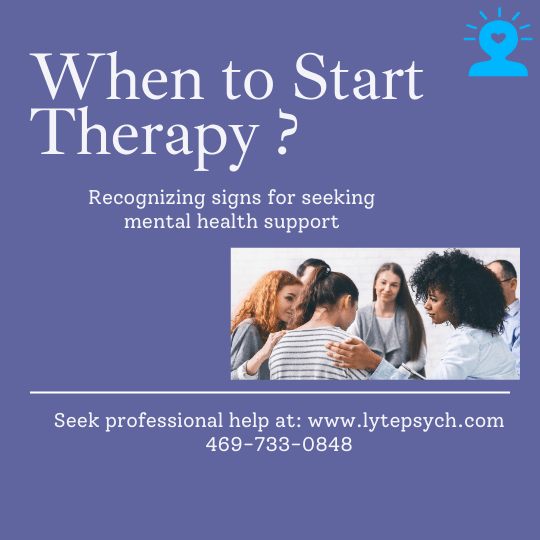Tue Oct 08 2024
Top 6 Signs It’s Time to Start Therapy Expert Guide from Lyte Psychiatry (Best Therapist and Psychiatrist Near You) Best Adults and Adolescents Therapist and Psychiatrist Near You, Dallas, TX.

Top Signs It’s Time to Start Therapy Expert Guide from Lyte Psychiatry (Best Therapist and Psychiatrist Near You)
Mental health plays a critical role in our overall well-being, yet many people wait too long to seek professional help. Therapy is an effective way to manage emotional challenges, stress, anxiety, and other mental health conditions. But how do you know when it’s time to start therapy?
At Lyte Psychiatry in Dallas, TX, we provide expert mental health care for adults and adolescents, helping individuals recognize when it’s time to reach out for support.
Why Therapy Is Important?
Therapy offers a safe, nonjudgmental space to talk about your thoughts and feelings, develop coping strategies, and work through challenges. Whether you’re dealing with stress, anxiety, depression, or relationship issues, therapy can provide the tools to help you manage your mental health and improve your quality of life.
Top Signs It’s Time to Start Therapy
Here are some of the key signs that indicate it might be time to seek professional support.
1. Feeling Overwhelmed by Stress
Symptoms of chronic stress: Trouble concentrating, irritability, sleep problems, and physical symptoms like headaches or muscle tension.
2. Persistent Anxiety or Worry
Signs of anxiety: Restlessness, difficulty sleeping, constant worry, racing thoughts, and physical symptoms such as a rapid heartbeat or shortness of breath.
3. Feeling Sad or Hopeless
Depression goes beyond temporary sadness. If you’ve been feeling down, hopeless, or emotionally numb for more than two weeks, therapy is an important step toward getting help. Therapy can provide a safe space to talk through your feelings and develop strategies for improving your mood.
4. Difficulty Managing Anger or Irritability
5. Struggles with Relationships
Signs of relationship struggles: Constant arguing, difficulty communicating, withdrawing from loved ones, or feeling disconnected from others.
6. Experiencing Grief or Loss
Signs of complicated grief: Feeling stuck in sadness, inability to move on, isolating yourself from others, or finding it difficult to resume daily activities.
How Lyte Psychiatry Can Help
At Lyte Psychiatry, we offer personalized care for adults and adolescents facing a wide range of mental health challenges. Our team of experienced therapists and psychiatrists is dedicated to helping individuals recognize the signs that it’s time to seek therapy and providing the support they need to thrive.
1. Cognitive-Behavioral Therapy (CBT)
Cognitive-Behavioral Therapy (CBT) is one of the most effective treatments for anxiety, depression, and stress-related conditions. CBT helps individuals identify and change negative thought patterns, develop healthier coping mechanisms, and improve their overall mental health.
2. Medication Management
3. Individual Therapy
At Lyte Psychiatry, we provide both individual therapy helping patients address personal struggles and improve their relationships with loved ones.
4. Teletherapy Services
For those who prefer remote care, we offer teletherapy services, allowing individuals to access therapy from the comfort of their own homes. This flexible option ensures that patients can prioritize their mental health, even with busy schedules.
Take the First Step Toward Better Mental Health at Lyte Psychiatry (Affordable Therapist and Psychiatrist Near You)
If you’re experiencing any of the signs mentioned above, it may be time to start therapy. At Lyte Psychiatry in Dallas, TX, our compassionate team of therapists and psychiatrists is here to help you take control of your mental health. Contact us today to schedule a consultation and start your journey toward healing and well-being.
To Schedule an appointment. Click Here
To see our services. Click Here
Call us if you have questions at 469-733-0848
Frequently Asked Questions (FAQ)
Q: How do I know if therapy is right for me?
A: If you’re experiencing persistent feelings of stress, anxiety, sadness, or difficulty coping with life’s challenges, therapy can help. A therapist can provide tools and support to help you navigate your emotions and improve your mental health.
Q: Can therapy help with relationship issues?
A: Yes, therapy can be very effective for resolving relationship problems. Individual or couples therapy can help improve communication, resolve conflicts, and strengthen emotional bonds.
Q: Is teletherapy as effective as in-person therapy?
A: Yes, teletherapy is just as effective as in-person therapy for many individuals. It offers the same level of care, with the added convenience of remote access.
Q: Do I need medication, or can therapy alone help?
A: Many people benefit from therapy alone, particularly Cognitive-Behavioral Therapy (CBT). However, in some cases, medication may be recommended alongside therapy for more effective treatment.